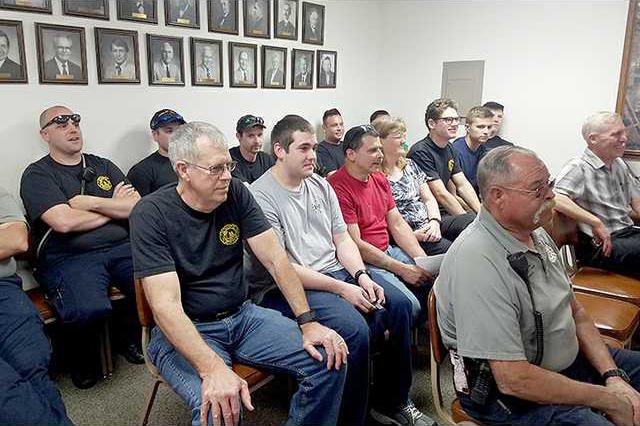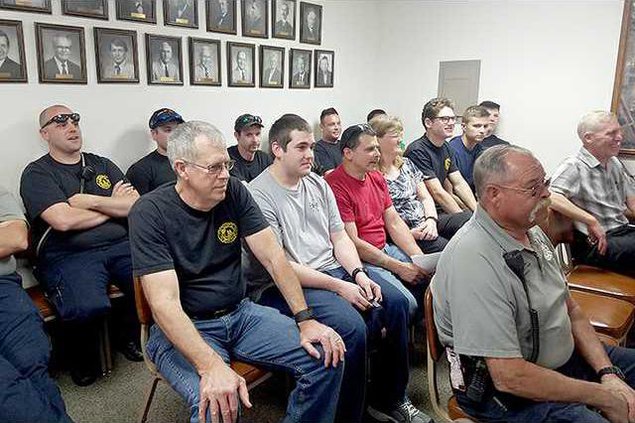City Council meeting at glance
Here is a quick look at what the Great Bend City Council did Monday night:
• In a special meeting prior to the regular agenda meeting, heard a report on the recently completed compensation study report. The council commissioned the study in December.
Then, during the regular meeting:
• With the Events Center carpet replacement project is scheduled for August, the council learned there were three bidders are in the final round – Kustom Floor Designs, Millers of Claflin and Sutherlands. The council picked Kustom Floor which had the lowest of the three comparable bids at $99,000.
The project involves 12 feet of tile around the perimeter of the main events room with the rest being carpet, a “walk-off” carpet in the back rooms, and mostly tile in the vestibule, foyer and Conference Room C.
The carpet will be in squares that can be replaced. The color scheme will be basically grays with some tan to match existing features.
The cost is in the city’s budget. The work will be done in August when there will be no events taking place in the facility.
• Authorized Mayor Joe Andrasek to sign agreements relative to the construction and maintenance of highway railroad crossing signals on Lakin Avenue, Forest Avenue and Grant Street. The agreements include Oklahoma Railroad Company, the City of Great Bend and the State of Kansas regarding installation of a crossing signal and flashing light straight post type gates.
The work is fully funded with federal money funneled through KDOT, engineering technician Karl Otter said. The only cost to the city is to maintain the signs leading up to the crossings, which it does anyway.
hese are crossings identified as needing safety upgrades.
• Heard a report from City Clerk/Finance Director Shawna Schafer on the 2018 city elections. The filing deadline for the November election is noon on June 1 and the filing must be done at the Barton County Clerk’s Office and there is a $20 filing fee.
The positions up for election on council are Vicki Berryman’s seat in Ward 1, Joel Jackson’s in Ward 2, Cory Zimmerman’s in Ward 3 and Brock McPherson in Ward 4.
• Approved closing the north half of Lakin Avenue from Main Street to Kansas Avenue from 7 a.m. to Midnight on Saturday June 2 for the June Jaunt events in Jack Kilby Square.
• Approved closing the Kansas Avenue from Broadway to Lakin Avenue from 9 a.m. to no later than 1 p.m. to accommodate the Great Bend Strongest/Fittest competition on Saturday June 2.
• Granted permission to host the June Jaunt Beer Garden in Jack Kilby Square. Also granted was a one-day cereal-malt beverage license for Sunflower Shrine Club to operate the beer garden.
• Authorized people to be in Jack Kilby Square past midnight on June 2 for the June Jaunt cleanup.
• Heard a report from Great Bend Chamber of Commerce President Jan Peters.
• Approved designating an abandoned house at 819 Adams as unsafe and dangerous. After the resolution is published twice in the Great Bend Tribune and a 30-day waiting period, there will be a public hearing at a June council meeting.
• Heard a report from Interim City Administrator George Kolb. He focused on a change in hours at the Front Door facility, the problems finding a network administrator and the city’s not switching to the 800-MHz emergency radio frequency at the same time as the county is doing so.
• Set the council’s budget planning meeting schedule, which starts with a preliminary budget workshop at 5:30 p.m. today (May 8). It ends with a public hearing and budget adoption Aug. 20.
• Approved abatements at: 1427 21st St. Accumulation of trash/refuse, owned by Richard Ogle; 1437 20th St. Accumulation of trash/refuse, owned by Duane Johnson; 1412 21st St. Accumulation of trash/refuse, owned by Cynthia Farris; and 2108 29th St. Accumulation of trash/refuse, owned by Tom Pearson.
In a City Council chamber packed with Great Bend firefighters, many disgruntled and frustrated with what they see as years of pay inequities, Human Resources Director Randy Keasling reassured them the recently completed city compensation study is merely the start.
“This is the beginning of a process,” he said.
This came as the Great Bend City Council held a special meeting Monday afternoon to hear a report on the study. The council commissioned from the study from Gallagher Benefit Services, a human relations consulting firm from Kansas City, Mo. last December to compare it with other communities in terms of employee salaries following last summer’s police department controversy.
In the end, a draft of the report indicated most city positions were in line with market averages, but shortfalls were found in the Police and Fire departments, said Gallagher Benefit’s Gail Meriweather.
It was also clear that the city would have to move from basing pay raises on longevity to basing them on performance.
On the agenda for this meeting was also a new salary policy manual to guide salary actions and outline policies regarding pay. Additionally, it defines categories of employees and how they should be compensated.
The study
“Your pay is fair,” Meriweather said. The firm first looked at the outside market to remain objective before plugging local numbers into the equation.
The city’s average comparison ratio for base salaries is approximately 95 percent, indicating that the city is paying consistently with the external market.
A comparison ratio is calculated when a specific employee’s current salary is divided by the current market rate for that same position. It takes into consideration the mid point of a salary range.
However, the report notes that this does not include uniformed police officers and fire fighters. And there are some employees paid below the minimum salary range.
To bring all the below-market personnel up to the market level would cost the city about $39,000, the biggest portion of that coming in the Fire Department. Of that total, $5,705.60 was in the PD, $24,692 in the FD, and $8,432 for the balance of city personnel including 12-13 employees.
Gallagher interviewed department heads and then did a market analysis. “We wanted to gather as many data points as we could,” Meriweather said.
She said there were three objectives: internal equity, external competitiveness and ease of administration. Gallaghar looked at job duties and descriptions, salary ranges, and how jobs were grouped and pay rankings, noting that some procedures followed in Great Bend are comparable with what is done in other cities and some are not.
Then, the firm looked at salaries. To determine the value for the city’s positions, drawing on several sources, including:
• Bureau of Labor Statistics’ Wichita Metropolitan Statistical Area, Kansas Wage Survey Wichita Kansas MSA, Kansas Municipal League Salary and Personnel Survey, Towers Watson Compensation Series, internal office reports, and Wage Wizard.
• The following Kansas municipalities were also referenced: Dodge City, El Dorado, Garden City, Hays, Hutchinson, Junction City, Lawrence, Liberal, McPherson, Newton, Park City, Pratt, Salina and Valley Center.
As for benefits, these were comparable, Meriweather said. She recommended adding a few more paid days off and increasing vacation time for long-term employees.
“We are already at close to market value, if not at market value,” Interim City Administrator George Kolb said. However, seniority-based raises have caused problems.
“It’s going to require a paradigm shift,” he said. “It is based on time-in-place, not performance. We recommend we move to performance standards.”
Department heads are already working together on these standards.
In the meantime, Kolb recommended all employees be raised to at least the market minimum.
Not everyone was happy
“There are several major issues with that,” said Great Bend Fire Department Capt. Kevin Stansfield. He has been a captain for eight years and has seen new hires and new captains being paid nearly as much as he is.
“That is unjust,” he said. His sentiments were echoed by many of his fellow firefighters present, who were also worried about retirement packages.
“These problems are caused by pay structures in the past,” Kolb said. Pay ranges have shrank as starting salaries were increased to fill hard-to-fill openings.
This is an example of the problem with across-the-board raises as well, Meriweather said. Stansfield is one of those who falls below the 95 percent.
There are also difficulties factoring in such things as extra training and certifications. Some firefighters are emergency medical technicians or paramedics and this complicates pay ranges.
So, Meriweather said, maybe some underpaid personnel should get higher raises. But, the problem comes in paying for this and how it impacts the city’s budget.
“This is important because we want to do what’s best for you guys,” Mayor Joe Andrasek said. But, “you’ve got to start somewhere.”
“What your are seeing here is a number of years of frustration,” Keasling said. But, new policies should address this.
City administrators will meet individually with staff members, starting this week to gather input and hear concerns.
Even if something is approved in the near future, Kolb said it could take a year or two for the problem to be corrected.
History
The idea for such a study was born of the Great Bend Police Department controversy last summer and the need to bring police pay rates in line with other communities, Interim City Administrator George Kolb said. But, the council realized it needed to be more extensive and look at all positions.
A divided City Council approved what proved to be a controversial project. Some on the council at the time balked at the price, noting this should have been the job of the newly hired Keasling.
This marked the first time since 1999 that the city has undergone a comprehensive wage and compensation study.
The council voted in December 2017 to hire Gallagher to complete the study at a cost of $31,725. The firm estimated it to be completed in three months, in time to prepare the city’s 2019 budget.





